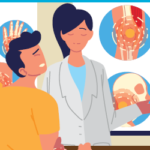
During the OAR Advocacy Day at the Ohio Statehouse on May 4, 2017, are: Dr. Ott, in the black suit, flanked by three OAR board members, a CNP and thre residents from the Internal Medicine and Family Practice residency programs at Fairfield Medical Center in Lancaster, Ohio.
Like many other state rheumatology associations, the Ohio Association of Rheumatology (OAR) has recently been actively advocating for patient care at the state legislative level. The most recent example of OAR’s efforts included an Advocacy Day on May 4, when members met with state legislators to discuss topics of interest. It was the fourth such event for OAR. Topping the current advocacy agenda are Senate Bill 56 and its companion bill in the House, HB 72, which aim to reform step therapy protocols by, among other things, requiring that an insurer’s process for requesting a step therapy override be transparent and available to the provider and patient; and by allowing automatic exceptions to step therapy requirements under certain conditions, such as when the patient is stable on a prescription drug for the medical condition under consideration.
Similar to step therapy reforms recently passed in Texas, the goal is to ensure that step therapy programs are based on clinical guidelines developed by independent experts rather than solely on monetary considerations.
Step, or fail-first, therapy is a concern to many rheumatologists, notes OAR President Stephanie J. Ott, MD, FACR, a rheumatologist with Fairfield Medical Center in Lancaster, Ohio. For example, one of her patients was doing well with CellCept to manage her scleroderma, but was forced to stop the medication when she switched insurance carriers.1 Now, the patient is not doing as well and is on medication for pulmonary hypertension, says Dr. Ott.
Successes at the State Level
Dr. Ott introduced the idea of policy advocacy to the OAR Board of Directors after she had experienced spring advocacy days through the ACR. (She is a member of both the ACR Government Affairs Committee and the ACR’s Affiliate Society Council.) She has met with many of her state legislators personally and has found they want to learn about these issues. She says, “Sometimes, you are able to get a little more bipartisan work at the state level because it’s in everyone’s best interest to work together.” With ACR and Arthritis Foundation support, OAR has now seen passage of legislation regarding streamlining of prior authorization, as well as use of biosimilar medications.


